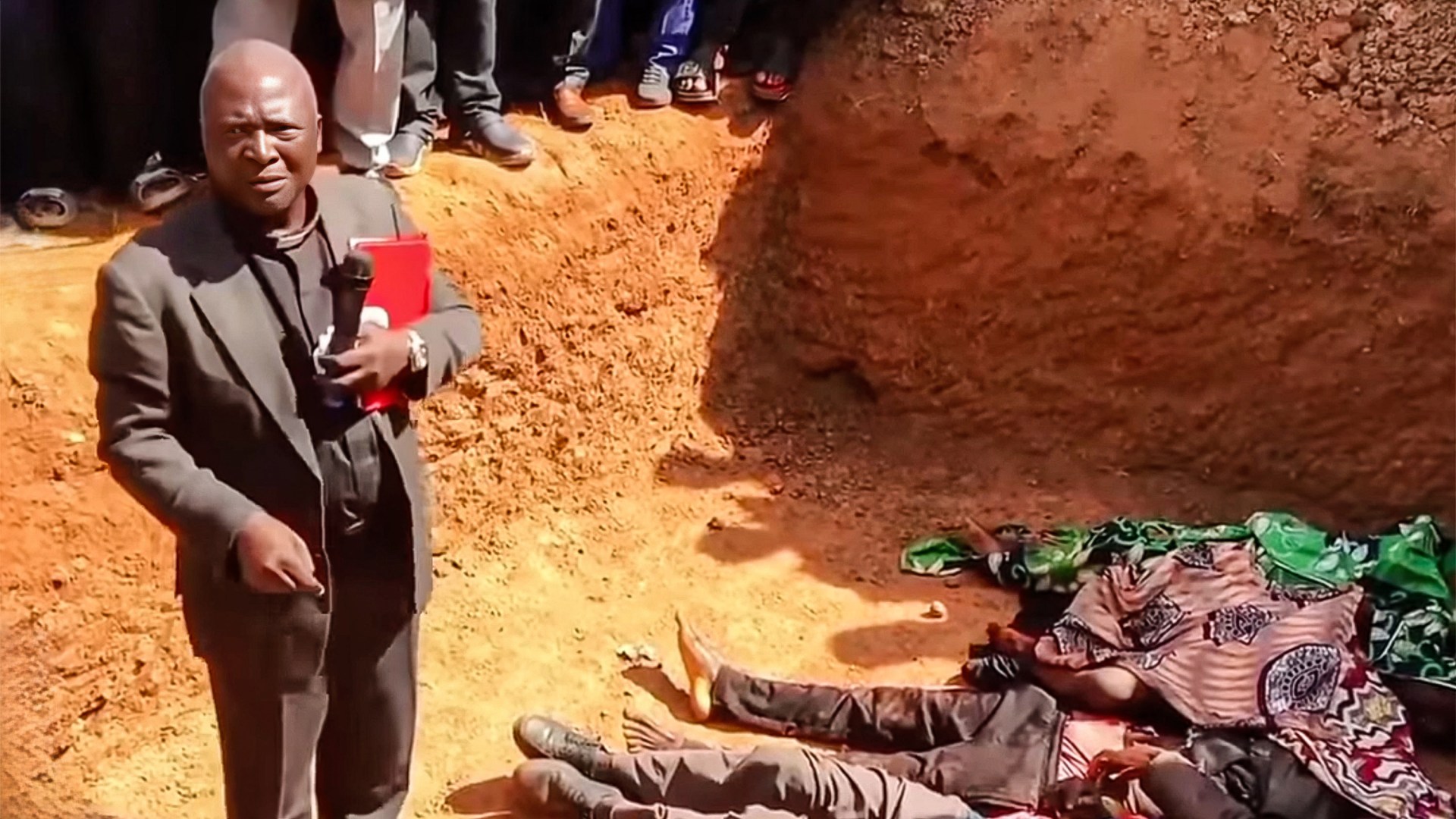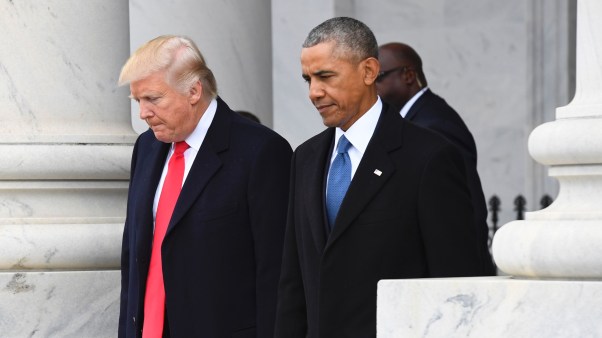A crowd of about 200 mourners gathered under the clear sky of Barkin Ladi in Nigeria’s Plateau State as pastor Ezekiel Dachomo officiated the mass burial of at least 12 Christian victims of Islamic militancy on October 15.
“I am in bitterness,” Dachomo told the crowd in a video posted online. In another video, Dachomo cries out, “We are tired to be outside performing burial every day, and they expect us to [be silent].”
He went on to call out the Nigerian government for denying the genocide of Christians and pleaded to the UN, the US Senate, and President Donald Trump to save them, as “they are killing Christians in Nigeria.”
Dachomo, the regional leader of the Church of Christ in Nations, later told a local news outlet that he posted the video “so the world will not deny or forget the scale of the killings,” in what he calls an “ongoing Christian genocide.” Dachomo said he has received death threats over the phone and social media since speaking out.
On Friday, Trump seemingly responded to Dachomo and other Nigerian Christians’ cries by declaring Nigeria a Country of Particular Concern (CPC) for religious freedom.
For years, the Middle Belt states, where a majority Muslim north intersects with a majority Christian south, has witnessed a series of attacks by Muslim Fulani herders. The herders travel across Nigeria seeking grazing for their cattle. This leads to conflict with farmers who want to protect their crops. Some Fulani herders carry AK-47s, which are illegal in Nigeria, claiming the firearms are used to protect their cattle from hostile communities.
Meanwhile, remnants of the jihadist militant group Boko Haram continue to attack Christian villages in northern Nigeria.
The violence in central and northern Nigeria has been at the center of international debate since late September, when commentator Bill Maher drew attention to Christian persecution there. “[The Islamists and Boko Haram] are systematically killing the Christians in Nigeria,” Maher said on Real Time With Bill Maher. “They are literally attempting to wipe out the Christian population of an entire country.”
Maher’s comments received pushback from pro-government voices in Nigeria. “There is no systematic, intentional attempt either by the Nigerian government or by any serious group to target a particular religion,” information minister Idris Muhammed said.
Yet statistics from Open Doors International indicate that a Christian in northern Nigeria is 6.5 times more likely to be killed than a Muslim and more than 5 times more likely to be abducted. The Open Doors’ 2025 World Watch List ranks Nigeria as the seventh deadliest country for Christians.
Militants killed more than 7,000 Christians and abducted at least 7,800 Christians this year, according to an August report by the International Society for Civil Liberties and Rule of Law. The report also stated jihadists have a destroyed over 19,000 churches, displaced more than 1,100 communities, and killed 125,000 Christians since 2009.
The United Nations defines genocide as “acts committed with intent to destroy, in whole or in part, a national, ethnical, racial or religious group.” The forcible “transferring children of the group to another group” also qualifies a situation as genocide.
Some analysts argue that Nigeria’s mass killings don’t count as genocide since Islamic extremists also kill other Muslims they view as “apostate.” Dachomo contends that doesn’t mean militant groups aren’t targeting Christians. He argues that Fulani militants coordinate their attacks on Christian communities and that the government—currently Muslim-led—is turning a blind eye.
“These are Muslims chanting ‘Allahu Akbar’ when they are attacking,” Dachomo told CT. “That’s the first thing you hear them shout.”
Gimba Kakanda, senior special assistant to Nigerian president Bola Tinubu, attributed the killings to herder-farmer clashes and Nigeria’s complex security crises. “The Fulani herders are mostly Muslim, while the farmers come from diverse groups,” he wrote. “This demographic divide can create the illusion of a religious war, but at its root are disputes over resources. Both sides have been perpetrators and victims.”
Zayiri Yusuf, a Nigerian political analyst, disagrees, saying Islamic groups have primarily targeted Christian communities: “I am yet to find any Muslim community where people have been sacked and others came in to occupy those places.”
When Fulani herders attacked Yelwata, Benue State, in June, they first targeted the local Catholic church before moving on to private homes. They slaughtered at least 1,000 residents overnight in multiple strikes. Their attacks have also spread to the south.
Boko Haram’s 2009 insurgency, which sought to establish an Islamic caliphate across northern Nigeria, also threatens Christians. Boko Haram opposes democracy and rejects Western-style education, which they link to Christianity.
In 2012, Boko Haram issued an ultimatum giving Christians living in northern Nigeria three days to leave the area. They bombed churches and kidnapped unsuspecting victims, including young schoolgirls whom they forced to convert to Islam. In 2018, Boko Haram abducted Leah Sharibu, a Christian schoolgirl, in Dapchi, Yobe State.
Boko Haram returned more than 100 of the kidnapped girls, most of them Muslims, after negotiations. But they demanded that Sharibu renounce her faith, wear a hijab, and recite Islamic declarations. When she refused to covert, they kept her captive.
Veronica Kaduwa, who spent more than three years in Boko Haram captivity before escaping, said she experienced sexual abuse, torture, and pressure to convert to Islam. Kaduwa told CT she saw Sharibu, now a mother of at least three children, in the forest: “Sharibu encouraged me not to convert to Islam.”
Boko Haram split in 2016 after a leadership crisis, which the Nigerian military saw as a sign of the group’s impending demise. However, the Islamic State in West Africa Province (ISWAP), a splinter group, continues to wreak havoc across northeast Nigeria and the Lake Chad Basin.
In April, ISWAP claimed responsibility for two attacks on Banga village, a Christian community in Adamawa State, killing two Christians and destroying more than 30 houses and a church. Analysts described this as a strategic resurgence.
In recent months, US politicians have started speaking up. Early this month, West Virginia Rep. Riley Moore urged the US government to once again designate Nigeria as a CPC, an act that could lead to sanctions. Trump had given Nigeria that designation in December 2020, but former president Joe Biden lifted it a year later. On October 31, Trump restored Nigeria’s CPC status.
In September, Texas Sen. Ted Cruz introduced the Nigeria Religious Freedom Accountability Act of 2025 to impose sanctions on Nigerian officials enabling jihadist violence and enforcing blasphemy laws against Christians in majority Muslim states. Cruz accused the Nigerian authorities of “ignoring and even facilitating the mass murder of Christians by Islamist jihadists.”
In Sokoto State, police allegedly failed to properly prosecute the lynching of Deborah Samuel, a Christian accused of insulting Muhammad in a WhatsApp group in 2022. The suspects went free.
While the Nigerian government has set up special security units to defend farmers from jihadist groups Boko Haram and ISWAP, locals say extremist violence persists.
Dachomo said police and military are difficult to contact whenever militants attack Christian communities because official phones are often switched off. Even when the police answer the phones, “They do nothing.”
In Barkin Ladi, Dachomo has seen boys as young as 12 form vigilante groups, gathering sticks and cutlasses to defend against the attackers’ AK-47s.
“At night, we pray and wish each other a good night,” Dachomo said. “If we see ourselves alive in the morning we say, ‘Thank you, Jesus.’”












